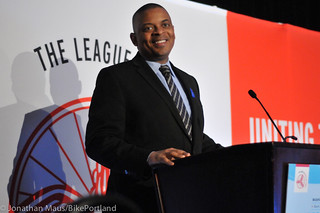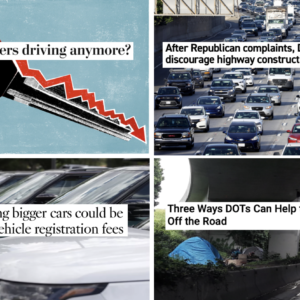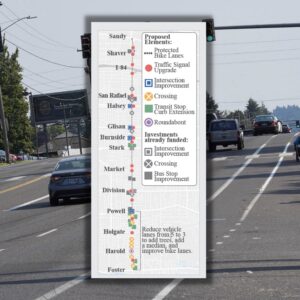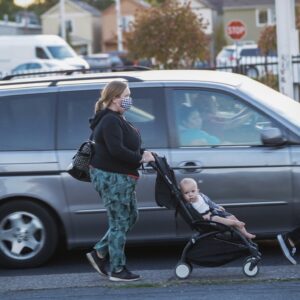—BikePortland’s coverage from Washington D.C. is made possible by Planet Bike.
U.S. Department of Transportation Secretary Anthony Foxx made his National Bike Summit debut today. The man that used to hold his job, Ray LaHood, was a crowd favorite for many years and had endeared himself with advocates for his pro-bike proclamations (sometimes delivered via tabletop).
Sec. Foxx was well aware of LaHood’s legacy and began his speech today by saying, “I have big shoes to fill.” Looking to bolster his cycling cred, Foxx showed a photo of himself riding one of Charlotte, North Carolina’s bikeshare bikes. Foxx oversaw the launch of bike share during his time as mayor of Charlotte.
After joking that the photo was of him competing in a stage of the Tour de France, Foxx said: “The truth is, I’m a huge fan of biking and my family is as well.”
Foxx’s speech focused on three core themes: the need for safety in the transportation system, the politics of passing a transportation bill, and — which is probably the most well-received portion of the speech — the idea that cycling’s inherent affordability offers even more benefits for low-income families.
When it comes to safety, Foxx has first-hand experience about how dangerous many roads are. He shared a story about being hit while walking crossing a street during his morning run. “I had the right of way, and a car came into the intersection and bumped me on the knee. So I’ve been a victim of what I’m talking about.”
Foxx said he’s aware that collisions involving walkers and bikers are going up around the country. He referred to it as a “crisis” and said he didn’t tolerate it as mayor. “And as U.S. Secretary of Transportation, we certainly won’t stand still and allow this crisis to slowly build up over time. Our roads should be safe and they should be easy places to travel no matter how we’re traveling on them.”
To make roads easier and safer to travel on, Foxx needs money. He touted the FHWA’s TIGER program, now in its sixth year, which he said has funded $150 million in “projects that have helped improve bike networks across America.”
“This isn’t just about recreation, this is about equality and creating opportunities to expand the middle class and help those folks trying to get into the middle class.”
Foxx spent a good portion of his speech touting he and President Obama’s newly released, $302 billion transportation plan (which is already coming under fire from Republicans). The details of that plan are expected to be released today, but he told the 700-plus bike advocates in the crowd that “We’ve made sure this plan includes the resources to step up bicycle and pedestrian programs.”
“I’ve made investing in bicycle and pedestrian improvements a priority,” the secretary added, “And so does the President’s plan.” If the plan passes, and he said that’s “a big if,” it will come with funding to continue and expand the federal government’s support for bicycling and walking investments.
As those funding opportunities come up, Foxx will remember an experience he had with a road diet project during his tenure in North Carolina.
A proposal to put a street on a “road diet” and add bike lanes caused a community uproar. “It was a really difficult time,” he recalled. But, as is usually the case, once the design was implemented, it was a big success. “We are actually seeing more traffic through that system now [with the reduced number of standard vehicle lanes] than before.”
The point he was trying to make is that we should focus on existing streets instead of adding capacity or building new ones. “Using the ones we have,” Foxx said, “it’ll be safer and more efficient.”
For Foxx, biking is about more than transportation. He sees it as a prime example of what President Obama has called “ladders of opportunity.” Foxx cited a League of American Bicyclists report that found one-third of bike trips are made by people who make less than $30,000 per year.
“This isn’t just about recreation,” he said, “this is about equality and creating opportunities to expand the middle class and help those folks trying to get into the middle class.” To increase access to bicycling, Foxx said that it’s just a matter of making it an option and providing basic infrastructure. “That bike path can be the ladder to school or a new job.”
Foxx expanded on this topic in the Q & A session:
“Next to housing, the single greatest investment most families are making is transportation. So, if we create multiple ways for families to reduce transportation expenses, we’re helping them build capacity to invest in other necessities… For instance, if a low-income family can make more use of a bicycle to get to and from places, that’s not only good for the environment, not only good for mobility writ large for everybody — it’s also good on their pocketbooks.”








Thanks for reading.
BikePortland has served this community with independent community journalism since 2005. We rely on subscriptions from readers like you to survive. Your financial support is vital in keeping this valuable resource alive and well.
Please subscribe today to strengthen and expand our work.
“Our roads should be safe and they should be easy places to travel no matter how we’re traveling on them.”
This isn’t right. For most roads, it should be harder, or at least less convenient, to travel on them by car.
Given the current environment, where it is easy to travel by car on 99% of the roads, I think his statement is fair.